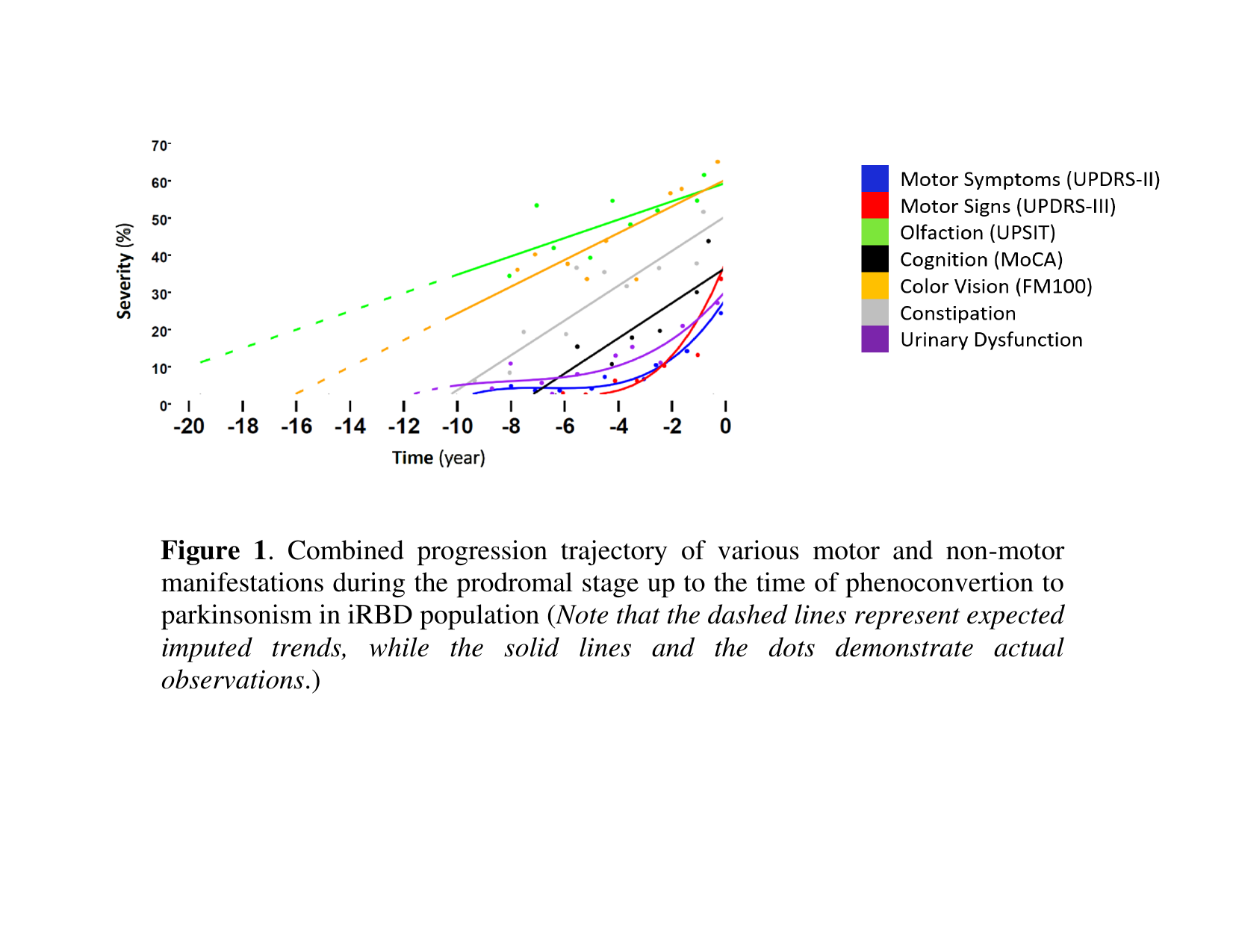Session Information
Date: Sunday, October 7, 2018
Session Title: Other
Session Time: 1:45pm-3:15pm
Location: Hall 3FG
Objective: To trace the evolution of early motor and non-motor manifestations of synculeinopathy from the stage of idiopathic REM sleep behavior disorder (iRBD) until defined neurodegenerative disease.
Background: Parkinson’s disease (PD) is preceded by a long prodromal stage with various sub-clinical motor and non-motor manifestations. Yet, the natural history and evolution of these prodromal features in the years before PD is diagnosed is unclear.
Methods: During 2004-2016, we recruited and annually followed 154 polysomnography-proven iRBD individuals, out of which 55 phenoconverted to defined parkinsonism or dementia. Longitudinal data on a broad list of features consisting of Unified Parkinson’s Disease Rating Scale parts I-III, quantitative motor tests, olfaction, color vision, cognition, and autonomic functions were gathered at each annual visit (average follow-up= 5 years, (range: 2-12)). The same measures were also assessed in 102 age- and sex- matched healthy controls. By looking backward from the time of parkinsonism diagnosis, we examined the trajectories of each prodromal feature using mixed effect models.
Results: Among cardinal motor phenotypes, bradykinesia appeared the earliest, approximately 5-6 years prior to phenoconversion, followed by rigidity (year -3) and tremor (year -2). Alterations in handwriting, turning in bed, walking, salivation, speech, and facial expression were the first motor functions to be disrupted, recognizable 6-7 years prior to parkinsonism diagnosis. Measures of the alternative tapping differed between iRBD people and healthy controls 8 years prior to the onset of parkinsonism. Beginning >20 years before phenoconversion, olfactory function appeared to decline, yet progressed with a slow trend. This is followed by impaired color vision and constipation as early as 16 and 10 years prior to phenoconversion. Within 7 to 9 years before parkinsonism is diagnosed, slight urinary dysfunction and subtle cognitive decline can be detected (Figure 1).
Conclusions: With direct prospective evaluation of iRBD cohort during phenoconversion, we demonstrated that hyposmia appears to be the earliest sign, followed by, impaired color vision, erectile dysfunction and constipation all >10 years before phenoconversion. Subtle motor manifestations start just 5-6 years prior to parkinsonism diagnosis; however, quickly progress. Alternative tapping is the most sensitive motor test for early screening of parkinsonism.
To cite this abstract in AMA style:
SM. Fereshtehnejad, C. Yao, A. Pelletier, J. Montplaisir, JF. Gagnon, R. Postuma. Evolution of Motor and Non-Motor Manifestations in Prodromal Parkinsonism [abstract]. Mov Disord. 2018; 33 (suppl 2). https://www.mdsabstracts.org/abstract/evolution-of-motor-and-non-motor-manifestations-in-prodromal-parkinsonism/. Accessed February 6, 2026.« Back to 2018 International Congress
MDS Abstracts - https://www.mdsabstracts.org/abstract/evolution-of-motor-and-non-motor-manifestations-in-prodromal-parkinsonism/

